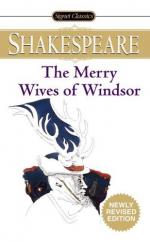|
This section contains 703 words (approx. 2 pages at 400 words per page) |

|
The Merry Wives of Windsor Summary & Study Guide Description
The Merry Wives of Windsor Summary & Study Guide includes comprehensive information and analysis to help you understand the book. This study guide contains the following sections:
This detailed literature summary also contains Further Study on The Merry Wives of Windsor by William Shakespeare.
The Merry Wives of Windsor focuses on how a community establishes and preserves its own standards. Outsiders like Falstaff, Fenton, Caius, and Evans cause a wide range of threats to Windsor's inhabitants. Evans and Caius threaten the conventions of language use that other characters rely on: the Welsh Evans has an accent, and Caius frequently misunderstands English expressions and imports French words into his speech. Even native speakers within the community often lack language skillsMistress Quickly mistakes Latin for vulgar English, and Slender frequently mistakes the prefixes and suffixes of words. But language is nevertheless used by the characters to define an inside group and an outside group; and foreigners are on the outside.
They are the object of the host's tricks, and remain the subject of humor throughout the play. There are many ways in which modern communities use language to distinguish among groups, and sometimes to exclude certain people or groups of people. For example, slang associated with younger people often receives ridicule and rejection from the adult community.
Falstaff poses a different kind of threat to the community of Windsor: he uses language exceedingly well, and in fact he is fully in control of his own jokes, fully capable of mocking other people (and himself) through language. But his cleverness also works against him. The very ruse he sets up to earn himself money reveals his capacity for using other people for his own ends. Trickster figures often appear as social outsiders, in many other literatures and in social life. Falstaff is not unlike a modern "class clown" who plays clever tricks, shows off, or tells jokes to get attention. As a result, he is punished in an elaborate and ceremonial way that may appear strange to modern audiences. The entire community dresses up as fairies from local folklore in order to torment a stranger. A distant analogy in modern life might be the jokes and disguises designed to frighten people on camping trips or at Halloween. But the punishment Falstaff receives is also quite strange, and it takes on a magical and even solemn quality all its own. Class anxiety is the source of much of the play's conflict. The Order of the Garter, which provides an underlying context for the whole play, was an order of knights with special privileges and a special relationship to Queen Elizabeth. Much of the play is staged at the Garter Inn, so named because the Order had its annual feast at Windsor. The host and inhabitants of the Inn aspire to be members of the court culture of Windsoror at least to serve that culturebut none of them actually has any contact with the court. Indeed, the community of the play is actually quite marginal to the court and to the trappings of nobility. Although they may have titlesFalstaff has the title of knightthese do not necessarily give them the cultivated conduct of gentry. Indeed, the play raises the question of what might constitute gentility, especially in relation to Anne Page. Though Caius has money and court connections, he is a blustering foreigner and therefore unfit to marry Anne Page; though Shallow and Slender remind us of their status as landowners, they are (as Anne says) "idiots" and therefore unfit to marry her. Fenton, with his connections to "the wild Prince and Poins," has no money, but Anne finds him suitable enough to marry.
In The Merry Wives of Windsor, nearly everyone claims to be a gentleman on the basis of title, land, court connection, or money. Falstaff is excluded from the community based on his distinctly ungentleman-like behavior toward the Mistresses Page and Ford; Caius and Evans are mocked because of their indiscretions. Only Fenton and Anne Page show propriety and discretionto the point of marrying in secret. In contemporary American life, class relationships are similarly ill-defined. Most people would claim to be "middle class," just as most people in The Merry Wives of Windsor claim to be gentry. Although wealthor lack of itis often accepted as the defining characteristic between classes, behavior and language are also used to distinguish class, just as they are in The Merry Wives of Windsor.
Read more from the Study Guide
|
This section contains 703 words (approx. 2 pages at 400 words per page) |

|



